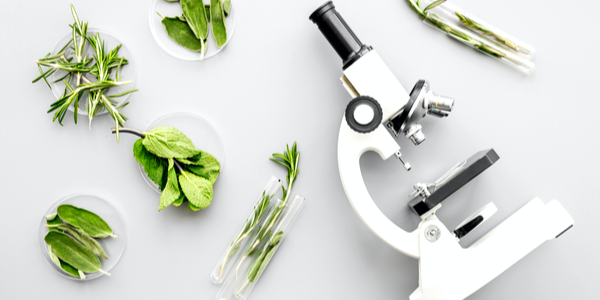
Ever wondered how two different people can eat and exercise very similarly but look and potentially feel completely different? These differing results likely have to do with nutritional genomics, a term that encompasses nutrigenomics and nutrigenetics.
In other words, this overarching concept begs the question, "How does the interaction of genetics and nutrition influence health outcomes?"
Allow this to be your comprehensive guide to nutrigenomics and discover how eating for your genes can positively impact health.
The History of Nutrigenomics
Although nutrigenomics is infant scientifics to the mainstream, the notion that genetics can point us to our best eating style is not new.
In fact, British physician Archibald Garrod received accolades for establishing a connection between genes, phenotypes, and nutrition as far back as the early 20th century.
However, the Human Genome Project of the 1990's solidified the modern era of nutrigenomics as it mapped out the human DNA sequence of the entire genome. This allowed scientists to better comprehend human nutrition at the molecular level of genetic expression.
These international nutrigenomics research efforts have ultimately revealed that real, whole foods are packed with compounds that extend beyond nutrients like protein, vitamins, or minerals and that they have a complex and synergistic relationship with our DNA expression.
In the long term, this will shift the health prevention and treatment paradigms from physiology and epidemiology to genetics and molecular biology, which will have numerous implications for the species and the planet as a whole.
So What Is Nutrigenomics?
First of all, nutrigenomics is a fascinating area of research that aims to reveal the interrelationship between genes, nutrition, and health.
The technical definition of nutrigenomics is "an emerging field that explores how our environment and the food we eat directly affect the functioning of our genes in regards to prevention and treatment of disease." Nutrigenomics includes the study of how the entire body reacts to different micro and macronutrients along with the relationship between single genes and food compound interactions.
Furthermore, while nutrigenomics and nutrigenetics are sometimes used interchangeably, the former concerns how nutrients influence the expression of genes while the latter refers to how your body responds to nutrients because of your existing genes. The rest of this article will focus on nutrigenomics.
Nowadays, certain nutrition-focused companies such as Nutrigenomix can employ molecular means to assess the nutrigenomics of an individual. The specific tests can vary, but in general, they are assessing how specific food compounds like beta-carotene or lycopene influence DNA sequencing, alter gene structure or expression and how this relationship contributes to disease predisposition.
As a more concrete example, someone who receives Nutrigenomix testing might discover that they have a genetic polymorphism that increases the need for folate and that ensuring adequacy can help prevent an oncogene (cancer-causing gene) from being turned on.
All in all, nutrigenomics aims to reveal how very specific nutrients can alter your individual gene expression so that you can follow an eating style that reduces chronic disease risk and promotes optimal vitality.
Benefits of Nutrigenomics
With most trendy nutrition topics, the hype tends to be larger than its true benefits. However, nutrigenomics can be advantageous in the health world.
Personalized Nutrition
Without a doubt, individualized or personalized nutritional medicine is the greatest potential benefit of nutrigenomics.
Most people are accustomed to trying their family's latest diet or TikTok newest health trend without considering the nuance of how different eating styles can affect separate people. Each and every person has a unique health situation and different people will respond better or worse based on their genetic inclinations.
Nutrigenomics can help individualize the specific nutrients and compounds someone needs to optimize health, whether for prevention or treatment. In essence, nutrigenomics is assessing individuals' genetic strengths and weaknesses and targeting areas that need more or less support.
An example: a 30-year-old woman enters a registered dietitian's office complaining of constant bloating, other digestive upset, pain when eating high-fat meals, cystic acne and other rashes, brain fog, and more. After testing, results reveal Lyme disease and her genetics show she could actually benefit from a very high-carb, low-fat plant-based eating style.
Even though high-carb diets tend to not benefit a lot of people; even though high-fat diets often better balance blood sugar and supply extremely important omega-3 fatty acids; even though all her friends are eating chicken breast and zucchini for lunch; this client's genes reveal a different health and metabolic picture, unique to only her. Had she tried to eat a high-fat diet loaded with animal foods, she likely would not have seen symptom relief at all.
Bioindividuality, which stems from genetics, is the forefront of health and the single most important factor that should determine how you eat and really, how you live.
Provides the 'Why'
Many nutritional principles are indeed universal. Without a doubt, increased consumption of fruits and vegetables extends longevity and vitality. On the other hand, high consumption of packaged and ultra-processed foods harms metabolism.
But it can be difficult to adopt these principles when the why is not clear.
Well, nutrigenomics aims to really show the why of these principles. Why will eating more fibrous fruits and veggies specifically help me? Receiving Nutrigenomix testing might reveal that you have a genetic marker that increases the propensity to store extra cholesterol and that eating more fiber helps negate this polymorphism.
Just like the teen who wants to be told exactly why they cannot attend the big party, most people need an incentive to change habits, especially eating ones. Dietitians and other health practitioners need more ways to explain the why to their clients and patients. People are simply more likely to follow a recommendation when they know exactly how or why it can impact them and nutrigenomics provides this opportunity.
Sustainability
Finally, nutrigenomics has implications all the way down to our food system.
Imagine if the majority of people knew exactly how to eat to best support their health nearly every day. Without a doubt, food waste would decrease, processed and packed food consumption would plummet and we would diversify the types of food being regularly eaten. Not to mention, all the resources used to supply food would be better utilized and distributed and healthcare costs would likely be reduced.
Improving individual nutrition inevitably enhances sustainability efforts, which is very important in this ethically-driven era.
The Bottom Line
The concept that every body is different applies to more than just how it looks. Everyone's internal body functions and responds to nutritional and environmental inputs differently thanks to our genes.
And although nutrigenomics is still an emerging field of science, it is quite promising because it aims to individualize nutrition recommendations down to the genes. Discovering how your body reacts to more or less saturated fat or that you need more vitamin B12 than the average person could mean the difference between preventing hereditary heart disease or malnutrition and needing a triple bypass surgery at 40 or injection shots for the foreseeable future.
Dietitians have been harping for decades that nutrition is not a one-size-fits-all. Nutrigenomics is a great ally to demonstrate this concept while also personalizing lifestyle approaches that will keep you vital and vibrant for the long haul.
References:
Araya-Fischel X. This Is the Personalized Nutrition Science You'll Be Hearing about Everywhere. Mindbodygreen. Published December 15, 2021. https://www.mindbodygreen.com/articles/nutrigenomics.
Dennett C. The Future of Nutrigenomics.Today's Dietitian. Published October 2017. https://www.todaysdietitian.com/newarchives/1017p30.shtml.
Garone S. Nutrigenomics Might Be the Future of How You Eat. Healthline. Written March 16, 2021. https://www.healthline.com/health/food-nutrition/nutrigenomics-might-be-the-future-of-how-you-eat.







